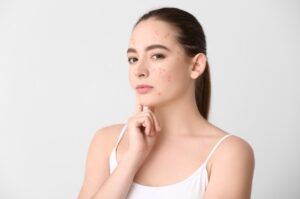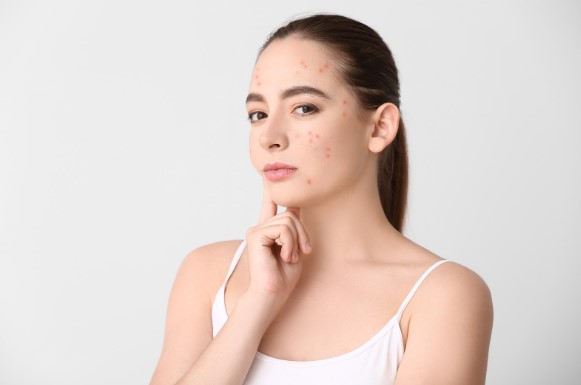 Are you dealing with unsightly and painful blemishes on your face or body? Acne breakouts can affect all kinds of people, but the good news is that there are effective treatments to help get rid of that embarrassing rash. Whether you’re an adult suffering from chronic acne, a teenager struggling with occasional breakouts, or even someone who just wants to take preventative steps against future outbreaks– this comprehensive guide offers everything you need to know about acne. Learn more about what causes it, how to treat it, and ways to reduce flare-ups in order to regain smooth and clear skin!
Are you dealing with unsightly and painful blemishes on your face or body? Acne breakouts can affect all kinds of people, but the good news is that there are effective treatments to help get rid of that embarrassing rash. Whether you’re an adult suffering from chronic acne, a teenager struggling with occasional breakouts, or even someone who just wants to take preventative steps against future outbreaks– this comprehensive guide offers everything you need to know about acne. Learn more about what causes it, how to treat it, and ways to reduce flare-ups in order to regain smooth and clear skin!
What is acne and what causes it
Acne is a common and frustrating skin condition that many people experience at some point in their lives. It’s characterized by the appearance of small, red bumps on the face, neck, chest, and back, among other areas.
What causes acne is not entirely clear, but it’s believed to be linked to a combination of factors, including excess oil production, clogged hair follicles, and an overgrowth of bacteria on the skin. Hormonal changes, such as those that occur during puberty, can also play a role in the development of acne.
While it can be frustrating to deal with, there are many treatment options available to help manage acne and keep breakouts under control.
Signs of Acne
A common sign of acne is the appearance of red, inflamed bumps on the face, neck, chest, back, or other areas. These bumps can be small and white in color (whiteheads) or larger and darker (blackheads). In some cases, they may become filled with pus.
In more severe cases of acne, cysts, and nodules can form. Cysts are larger, pus-filled lesions that may be painful to the touch. Nodules are even more severe and appear as large bumps on the skin, which can cause scarring if they’re not treated properly.
Types of acne
Acne can be a frustrating and sometimes painful skin condition that affects many people. There are several different types of acne, each with its own unique characteristics.
Blackheads are characterized by small, black, or dark bumps on the surface of the skin, while whiteheads are small, white, or flesh-colored bumps that appear just beneath the surface.
Cysts and nodules are larger and often more painful types of acne that can be deep beneath the surface of the skin. Regardless of the type, treating acne effectively often requires a combination of lifestyle changes, skincare routines, and potentially medication.
How to treat acne
Dealing with acne can be frustrating and it can often feel like nothing works. Yet, there are remedies that can be found right in your own home as well as over-the-counter medications that can provide relief.
Some popular home remedies include using tea tree oil, honey, or apple cider vinegar on the affected area. Over-the-counter medications such as benzoyl peroxide and salicylic acid are also effective in treating acne.
However, it’s important to note that what works for one person may not work for another, so it may take some trial and error to find the right treatment method. Remember to always consult with a dermatologist before beginning any new treatments to ensure the best results.
Tips for preventing acne
Acne can be a frustrating and stressful condition, but there are several tips you can incorporate into your daily routine to help prevent breakouts. Firstly, always wash your face before going to bed to remove any excess oil, dirt, or makeup that may have accumulated throughout the day.
Secondly, avoid touching your face with your hands to prevent the spread of bacteria and oil. Additionally, make sure to change your sheets and pillowcases regularly as they can accumulate sweat and oil while you sleep.
Finally, consider incorporating a consistent skincare routine that includes non-comedogenic products and gentle exfoliation to unclog pores and promote healthy skin. By implementing these tips into your daily life, you can help prevent acne and achieve clearer, healthier skin.
When to see a doctor for acne treatment
Acne can be a frustrating and persistent skin condition that affects people of all ages. While mild cases of acne can often be managed with over-the-counter products, more severe cases may require medical attention. If your acne is causing pain, and scarring, or is particularly persistent, it may be time to see a doctor for treatment.
Additionally, if your acne is accompanied by other symptoms such as fever or fatigue, it may be a sign of an underlying condition that requires medical attention. Don’t suffer in silence, reach out to your doctor for help in managing your acne and achieving clearer, healthier skin.
Moreover, Many people also go to alternative professionals such as Hypnotists in Houston to get help in their skin treatment journey.
Acne can be a difficult skin condition to manage, but it doesn’t have to be unmanageable. By understanding the underlying causes and types of acne and treating it with remedies and medications in combination with a good skin care routine, you can take control of your skin. Educate yourself about these treatments so you know when you should use over-the-counter solutions and when you need to visit a dermatologist for more advanced treatments. With the right combination of prevention, home remedies, and medical assistance, you can keep your skin looking clear and healthy! Don’t forget that while using any kind of medication or treatment is important, self-care should always come first – think positive thoughts and make sure to love your unique self, inside and out.

